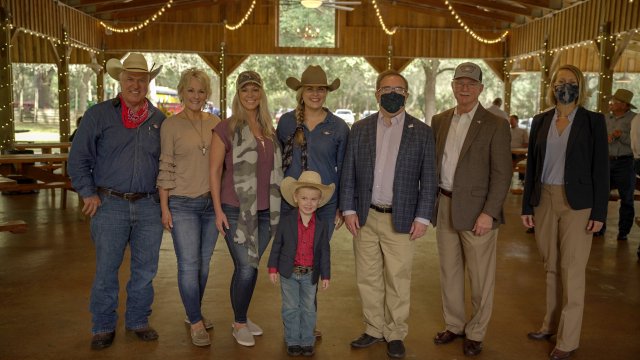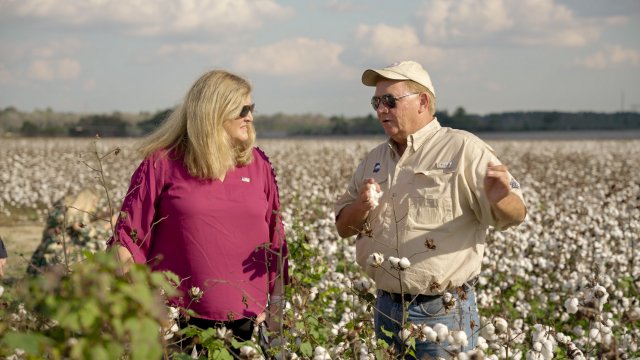Administrator Wheeler Meets with Agricultural Stakeholders in Florida, Georgia
Savannah, Ga. (October 27, 2020) — Today, U.S. Environmental Protection Agency (EPA) Administrator Andrew Wheeler, EPA Assistant Administrator for Chemical Safety and Pollution Prevention Alexandra Dunn, and EPA Region 4 Administrator Mary Walker visited farms in both Florida and Georgia, signing a Memorandum of Understanding (MOU) with the Georgia Department of Agriculture and announcing the 2020 dicamba registration decisions.
“EPA is proud of its strong relationship with the agricultural community, and this MOU and re-registration of Dicamba are more examples of ongoing cooperation,” said EPA Administrator Andrew Wheeler. “EPA worked hard so farmers can use previously purchased dicamba despite a surprise court decision in June that threatened to end the planting season — and the livelihood — of many farmers. With this reregistration, farmers will have more confidence about their crop investments for the next growing season.”
Administrator Wheeler began the day at the Diamond D. Ranch, Inc. in Jacksonville, Fla. with U.S. Congressman John Rutherford (FL-04) and the Florida Farm Bureau, where he previewed an upcoming MOU between the agency and the Florida Department of Agriculture.
“The coronavirus pandemic has demonstrated the importance of a steady domestic food supply, which our farmers and producers have stepped up to provide,” said U.S. Congressman John Rutherford (FL-04). “With today’s announcement, the Trump Administration is once again putting American farmers first, supporting the agriculture industry and ensuring our environment remains clean and free of pollution and waste. Thank you to EPA Administrator Wheeler for spending time today with Florida farmers and those working in the agriculture sector, the second largest economic driver in the state.”
“Historically, the EPA has treated farmers and ranchers as culprits rather than partners in caring for our natural resources,” said Florida Farm Bureau President John L. Hoblick. “Thanks to the current administration and Administrator Wheeler, farmers and ranchers can engage in a healthy and honest dialogue with EPA to address the conjoined challenges of feeding the world while preserving our water and lands. Farmers are the leading environmentalists in this country, and we are grateful for the ongoing collaboration with EPA.”
While at the Cromley Farm in Brooklet, Ga., Region 4 Administrator Mary Walker and Georgia Commissioner of Agriculture Gary Black signed a MOU to establish collaborative efforts and foster relationships between agencies.
“This MOU with the Georgia Department of Agriculture demonstrates our commitment to better engage with the agricultural community,” said EPA Region 4 Administrator Mary S. Walker. “Protecting our nation’s air, water and land resources are goals both the EPA and the Georgia Department of Agriculture share, and we will partner towards finding opportunities to work together to achieve success.”
“The Georgia Department of Agriculture appreciates the opportunity to enhance communications and future collaborations with EPA Region 4 and our Regional Administrator, Mary Walker,” said Georgia Commissioner of Agriculture Gary Black. “Our agency’s share a vital and mutual goal of conserving and protecting our precious natural resources which allow for the food and fiber production necessary to sustain a growing population.”
The MOU between EPA and the Georgia Department of Agriculture includes communication/coordination; education and outreach; and recognition of environmental stewardship activities. Highlights in the MOU include:
- Hosting Agriculture Roundtables and/or Educational Farm Tours to foster a dialogue between EPA and the agricultural community on the successes, challenges, and opportunities to work together to achieve well-managed, productive farms and a clean environment.
- Participating in agricultural events such as state fairs, farm shows, and technical field days to expand open discussion between EPA and the agricultural community.
- Recognizing farmers for their environmental stewardship and conservation efforts that contribute to efficient farms, healthy soils, and clean water.
In addition to Regional Administrator Walker and Commissioner Black, Administrator Wheeler was joined by U.S. Congressmen Buddy Carter (GA-01), Austin Scott (GA-08), and Rick Allen (GA-12), American Farm Bureau Federation President Zippy Duvall, and National Cotton Council President Kent Fountain at the farm. He announced the approval of new five-year registrations for two dicamba products and extending the registration of an additional dicamba product.
“This is a very important announcement for our agriculture community,” said U.S. Congressman Ear "Buddy" Carter (GA-01). “Halting the use of herbicides that farmers have already invested countless dollars in would lead to devastating damage for our farmers and rural communities. I applaud the EPA for providing this much needed security and clarity for the agriculture community moving forward, and I think Administrator Wheeler for coming to Georgia to tell our farmers firsthand.”
“President Trump and his Administration understand the importance of our agriculture industry, and when American farmers speak, they listen. Today’s announcement will provide access to important dicamba products that will allow our farmers to continue to be the most productive in the world and provide them with much needed flexibility,” said U.S. Congressman Rick Allen (GA-12).
“Our farmers make fiber, food, and fuel for the world, and without close partnerships with agencies like the EPA and certainties to plan operations, they would be unable to do so,” said U.S. Congressman Austin Scott (GA-08). “I’m very glad to see this MOU between EPA and the Georgia Department of Agriculture, and the announcement to allow new registrations of dicamba products for cotton and soybeans – two important crops in rural Georgia. This will balance environmental concerns while giving our farmers impacted by the effects of COVID-19 more certainty as they plan their operations. This move will better help farmers recover from market losses and collapses associated with the pandemic, and I look forward to seeing the positive impacts of this change for the industry and our rural communities who support agriculture.”
“We’re pleased the EPA has approved a new registration for dicamba that will allow farmers to plan for the next few years, removing a cloud of recent uncertainty. The registration demonstrates EPA’s continued commitment to using sound science to support its registration decisions and ensures farmers have access to a much-needed tool for weed management. Dicamba is one of many technologies farmers rely on as part of a sustainability strategy to protect crops while also reducing water use, retaining nutrients in the soil, and lowering emissions," said American Farm Bureau Federation (AFBF) President Zippy Duvall.
“The economic damage that would result from not being able to use dicamba herbicides would be tremendous," National Cotton Council (NCC) Chairman Kent Fountain said. "We greatly appreciate EPA's timely issuance of a new five-year label for this critical crop protection product for cotton producers."
All three registrations include new mitigation efforts to ensure these products can be used effectively while protecting the environment, including non-target plants, animals, and other crops not tolerant to dicamba.
EPA approved new registrations for two “over the top" (OTT) dicamba products—XtendiMax with VaporGrip Technology and Engenia Herbicide—and extended the registration for an additional OTT dicamba product, Tavium plus VaporGrip Technology. These registrations are only for use on dicamba-tolerant (DT) cotton and soybeans and will expire in 2025, providing certainty to American agriculture for the upcoming growing season and beyond.
To manage off-site movement of dicamba, EPA’s 2020 registration features important control measures, including:
- Requiring an approved pH-buffering agent (also called a Volatility Reduction Agent or VRA) be tank mixed with over-the-top dicamba products prior to all applications to control volatility.
- Requiring a downwind buffer of 240 feet and 310 feet in areas where listed species are located.
- Prohibiting OTT application of dicamba on soybeans after June 30 and cotton after July 30.
- Simplifying the label and use directions so that growers can more easily determine when and how to properly apply dicamba.
- Implementing new measures that consider how dicamba can affect endangered species and the resources that they may depend on.
###







